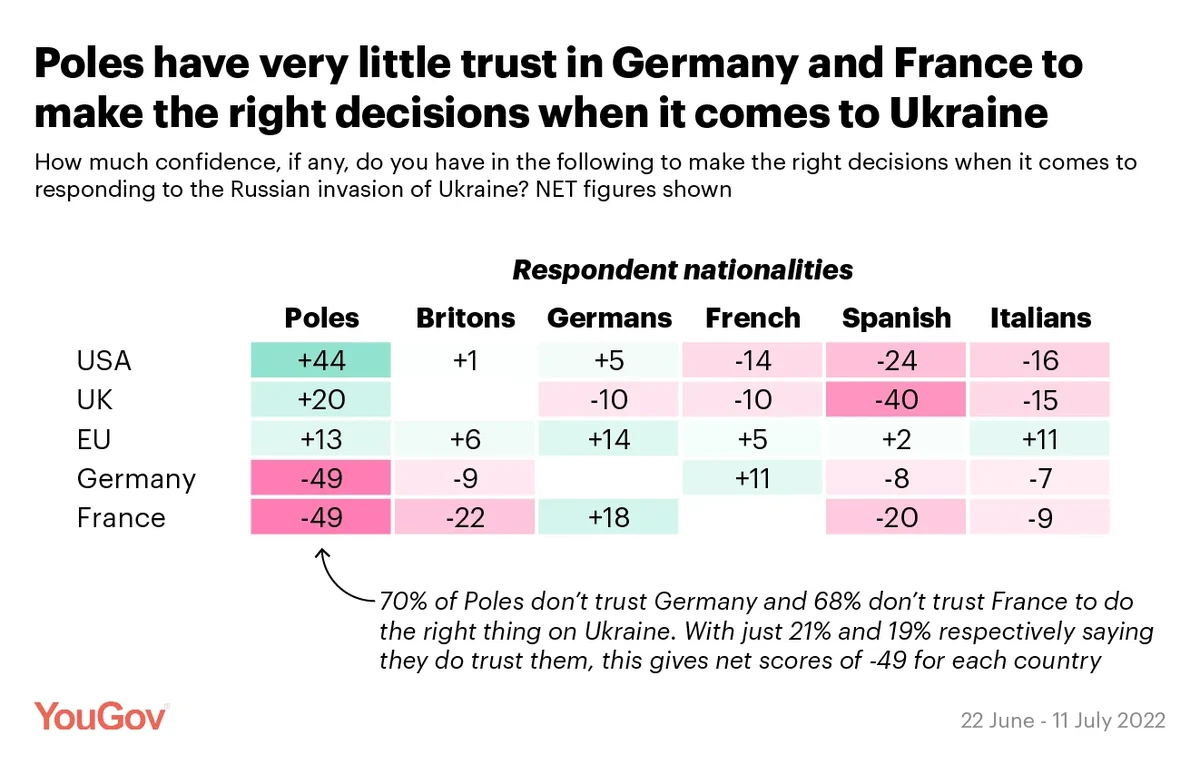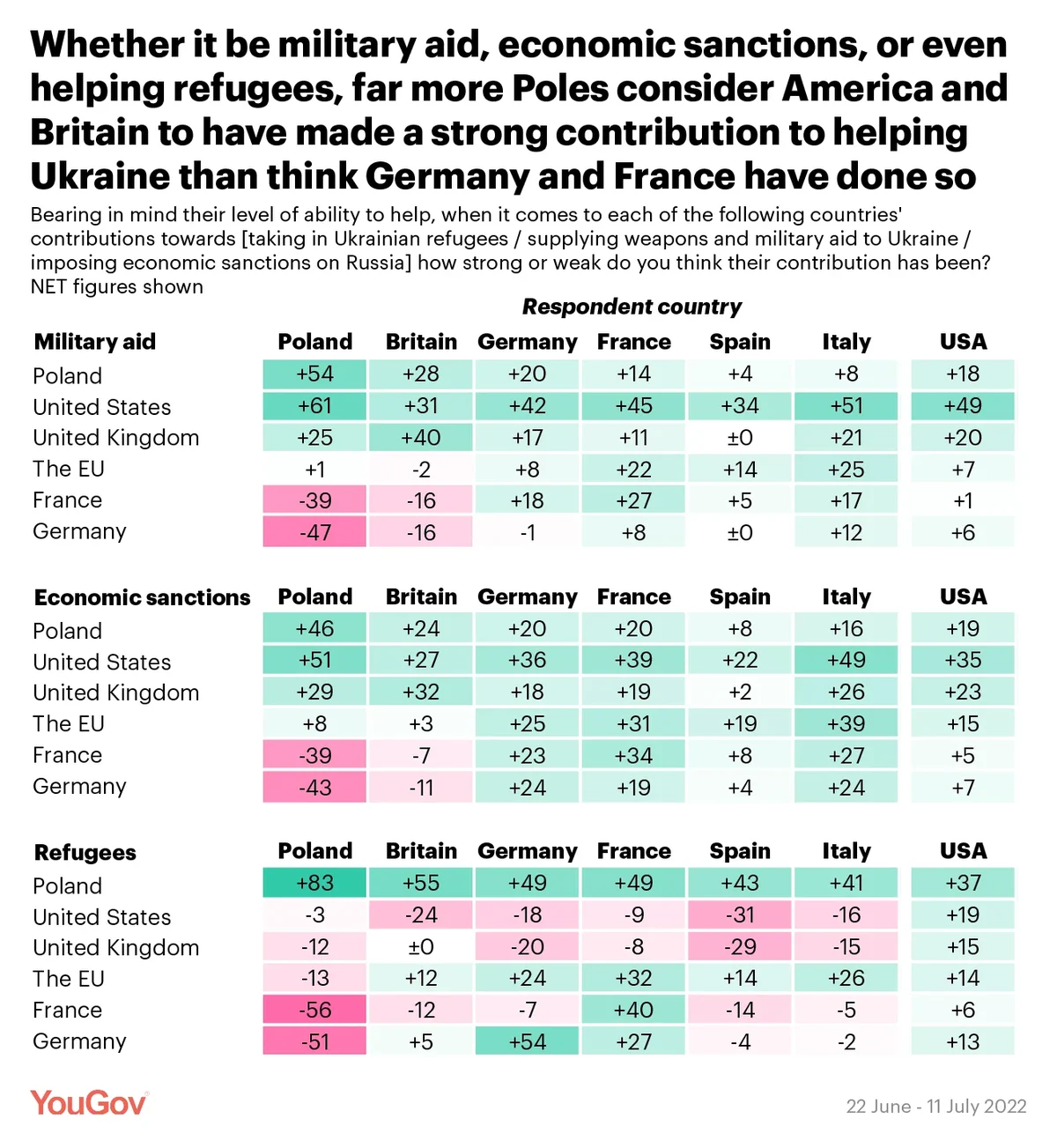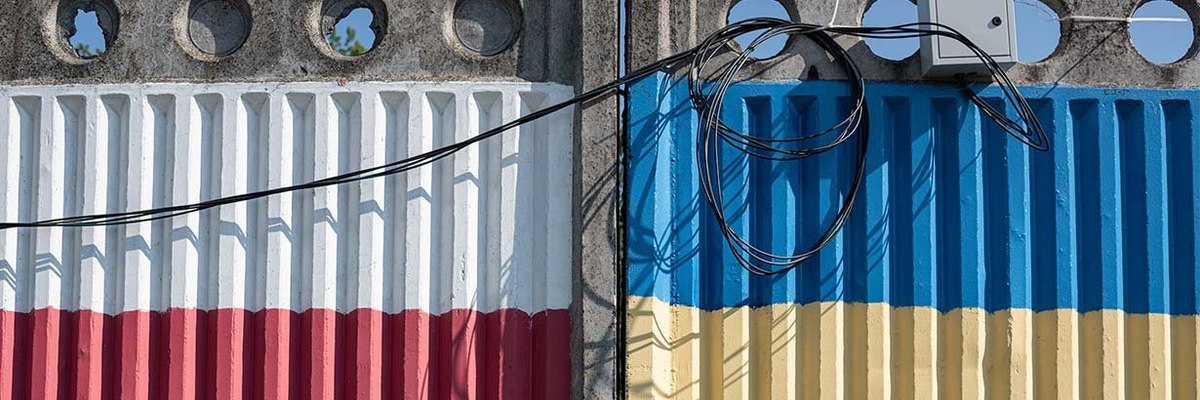Poles feel strongly that France and Germany have not been pulling their weight
Since the early days of the Ukraine invasion, YouGov has been tracking perceptions on the conflict in Europe. Now a new study, conducted in late June and early July, highlights results from the six most populous European countries – as well as the USA in some cases – but with a particular focus on the opinion from Poland.
Poland borders Ukraine, and for people there the war is a much more immediate experience, not least with more than a million Ukrainians taking refuge in the country. On most questions, Polish opinion tops the rankings for at least one perspective on a topic. In some cases, their attitudes differ markedly from the other countries surveyed, not least in their feelings towards other nations.
As of June-July, how many people are paying much attention to the war in Ukraine?
Poles are paying about as much attention to the goings on in Ukraine as people in most of the other countries surveyed, with 52% saying they are following news stories very or fairly closely. Germany proves to be an outlier on this score, with 69% of Germans saying they are closely following what is happening in Ukraine, including 32% who say they are doing so “very closely”.
In all cases, this represents a significant decline in attention compared to previous polling conducted in the early days of the invasion, in March.
Is the west doing enough to stop Russia winning in Ukraine? Who do people think is currently winning, and who do they expect to win?
Poles are the most likely of all nations asked to believe that Ukraine has the advantage in the current conflict, although this view is only held by 11% of people there. Three times as many (30%) say that Russia has the advantage, while 41% say that neither side does so.
By contrast, Spain is a notable outlier in its public’s perceptions of the conflict, with almost two thirds (64%) believing Russia to have the advantage. Just 25% think that neither side has the advantage. In all other countries, opinion tends to be relatively split between these two beliefs, with few thinking Ukraine is winning.
Poles are likewise the most likely to think that western countries are providing enough aid to stop the Russians winning, although again this only represents a minority view in Poland, at 29%. Half (53%) don’t think the west is doing enough to avert a Russian victory.
In fact, it is a majority view among all European publics surveyed that the west isn’t providing enough to stop Russia from winning. Unsurprisingly, given their strong belief that Russia has the advantage, the Spanish are far more likely than the other countries to believe that the west is not doing enough to prevent Russia victory (76%).
Poles are likewise the most optimistic that in a year’s time Ukraine will be an independent nation and Russian forces will have withdrawn, but again, only 21% think so. The predominant view is that the war will continue to drag on (49%), with only 11% expecting a Russian triumph by this time next year.
This is by far the most common view in all countries surveyed, with 45-53% expecting the war to grind on for at least 12 more months.
What countries do people trust to make the right decisions when it comes to the war in Ukraine?
The Russian invasion of Ukraine has presented the west with one of the most serious challenges in decades, with some countries being seen as having risen to the challenge, but others distinctly not.
From the Polish perspective, they are substantially more likely than the Western European nations to trust the USA (68%) and UK (54%) to do the right thing on Ukraine. These figures remain about the same as they were in the early days of the invasion, in early March.

Poles are, however, much less likely than other nations to trust France (19%) and Germany (21%) to do the right thing. In Germany’s case, this figure is eight points down since the early days of the war, but for France this represents a more than twenty-point drop in the number of Poles who trust the country to do what is right (from 40%). If Poland were to prove to be representative of wider opinion among eastern European countries, this would be a significant blow to the standing of the two driving nations behind the EU.
While Poles’ level of trust in the EU on the topic is roughly in line with that from other member countries surveyed (53%), this too represents a decline from 64% in early March.
Outside of Poland, there is limited trust among the other European publics. The Spanish are particularly distrustful, with a net untrusting view of all the other nations, and just +2 regarding the EU. They are especially likely to be sceptical of Britain, at -40.
In stark contrast to the views from Poland, the French and the Germans tend to trust one another on Ukraine, with the former giving the latter a score of +11, while the Germans rate France at +18.
How do people rate European and American contributions to arming Ukraine, helping its refugees, and sanctioning Russia?
These general perceptions among Poles are reflected when it comes to how they see more specific contributions made by countries to alleviating the Ukraine crisis. We again see that UK and US efforts are held in higher esteem by Poles than by those people in the other European countries surveyed. Likewise, Poles have more a negative assessment of the roles that France and Germany have played so far relative to what other Europeans think.
When it comes to rendering military aid, 72% of Poles say that the US has made a strong contribution, and 51% say the same of the UK. Two thirds (68%) also say the same of Poland itself.
But when it comes to France and Germany, just 16-18% of Poles believe them to have made a significant contribution. Germany in particular has been criticised in the west for its failure to provide military assets to Ukraine, and this is reflected by the fact that all countries surveyed rank them last on this measure (including Germans themselves).

The story is the same when it comes to sanctions, with the US (67%) and UK (54%) seen as making strong contributions, in contrast to Germany (20%) and France (also 20%).
When it comes to taking in Ukrainian refugees, positivity towards the US and UK is much more muted. Only 39% think America has made a strong contribution in this regard, and only 34% for the UK. Nevertheless, their contributions are still more valued than those of Germany (16%) and France (12%), despite the fact that Germany in particular has taken in far more Ukrainian refugees than either Anglo country.
Unsurprisingly, all countries surveyed see the US as having made the greatest contributions to Ukraine in terms of military aid. Poland likewise is acknowledged as having made a strong contribution to the refugee situation.
Do people think sanctions go far enough, and would they support more as the cost of living crisis bites?
Poles are the most likely of all European nations surveyed to think that current sanctions do not go far enough, at 63%. Spaniards (56%) and Britons (51%) tend to feel the same way, but in Italy and France these figures fall as far as 34% and 36% respectively.
Overall, three quarters of Poles (74%) support further sanctions against Russian interests in their country, about the same as Britain and Spain (75-76%), although notably higher than Germany (55%), Italy (56%), and France (62%).
However, Poles are feeling the cost of living pinch as much as anyone else. When asked if they would be willing to back further economic sanctions against Russia if it had an adverse effect on living conditions, Poles tend to be opposed. Nevertheless, they remain the most likely of the European countries to support further sanctions in the face of rising prices.
What actions do people support taking against Russia?
Poles are generally the most enthusiastic of the European nations surveyed in terms of taking action against Russia, although not necessarily substantially more so than some of the other countries.
Two thirds of Poles (68%) support sending further arms to Ukraine, the joint-highest level of support for this measure, alongside Britain. Both countries are also the most likely to support targeted media in Russian-speaking parts of Ukraine encouraging them not to support the Russian leadership or armed forces, at 65% in both.
Most Poles also support cyber attacks against Russian military capabilities (57%) and providing support to domestic political opponents of the Russian leadership (54%).
Support for direct military intervention is lower, however. While four in ten Poles support air strikes against Russian targets in Ukraine (40%), and a similar number support establishing a no-fly zone (38%), only 23% support sending troops into Ukraine.
This reluctance to take direct military action against Russia is reflected across all European countries surveyed.
Are countries doing enough to help Ukrainian refugees?
Poland has played host to far more Ukrainian refugees than any other country, and this fact is reflected in the results.
At the beginning of July, a quarter of Poles (27%) felt that the government had done too much to help and take in Ukrainian refugees, the highest of any of the European nations surveyed. A further 22% felt the government still had not done enough, and 39% said it had done about the right amount.
In Germany too, where large numbers of Poles have also settled, 22% believe their country has been doing too much on refugees. A similar number of French people (20%) say the same, despite their country taking in far fewer Ukrainians.
Briton comes bottom of the list, with just 7% thinking their country has done too much. There has been much criticism in Britain over the low numbers of refugees offered sanctuary in the early days of the crisis.
Half of Poles (49%) said that their country had a moral obligation to offer asylum to Ukrainian refugees, the joint lowest – alongside Germany – of the European countries surveyed. This figure has fallen from 65% in March.
This increased fatigue over refugees is reflected across the political spectrum in Poland, but especially on the right.
Among supporters of the ruling right wing Law and Justice party, belief in a moral obligation to assist Ukrainian refugees fell from 61% in March to 45% in early July, while the number disagreeing rose from 27% to 38%. Among those who voted for the liberal Civic Coalition in 2019, the decline has been more modest, from 70% to 62%.
Should Ukraine be allowed to join the EU or NATO?
On 23 June, the European Council gave Ukraine accession candidate status for joining the EU. YouGov data from March had shown that there was net approval in the four biggest EU nations to allow Ukraine in, and this latest survey shows this continues to be the case, with Spain and France becoming more supportive still.
In Poland – which had not been included in the March poll – people are even more enthusiastic about their neighbour joining them in the EU, with 73% of Poles saying they should be allowed in.
Two thirds of Poles (66%) also support NATO membership for Poland, although this is unlikely to mean they support joining the war against Russia. You can read more about the attitudes of European countries and the USA towards NATO from this survey here.
Image: Getty








